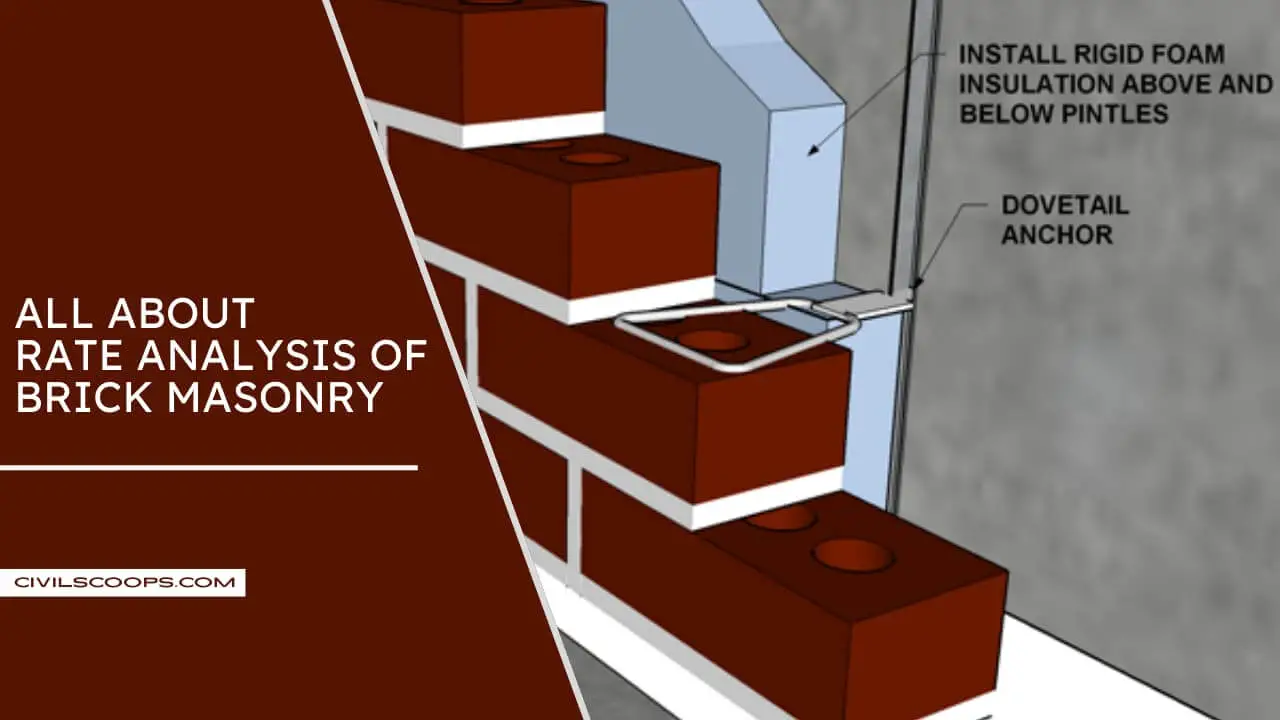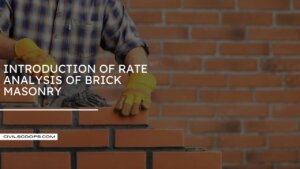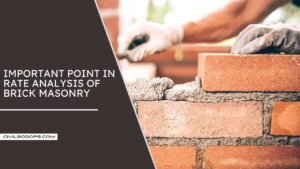All About Rate Analysis of Brick Masonry | Introduction of Rate Analysis of Brick Masonry | Important Point in Rate Analysis of Brick Masonry | Rate Analysis of Brick Masonry

Table of Contents
Introduction of Rate Analysis of Brick Masonry

Rate analysis of brick masonry used of reference book IS Code 1200 part 3(IS Code 1200 part 3 used for measurement), IS Code 2212, and CPWD Part 1.
All calculations of brick masonry for rate analysis. This calculation calculates of brick and mortar (mortar = Cement + Sand past this call mortar) for materials.
Mortar is used a sum different proportions 1:2, 1:4, 1:6, 1:8, etc.(1 cement: 2 Sand). This quantity estimation of bricks is required for the rate analysis.
Also, read: All About of Plumbing Fittings | What Are Plumbing Fittings | Types of Plumbing Fittings
Important Point in Rate Analysis of Brick Masonry

Measurement of Brick Masonry
In booking dimensions, the order will be consistent and generally at the sequence of length, breadth or width and height or depth or thickness.
Brickwork shall be measured in cubic meters unless otherwise specified.
Any extra work over the specified dimensions will be ignored.
Dimensions will be measured correct to the nearest 0.01 m, i.e., 1 cm. Areas will be calculated to the nearest 0.01 sq meters, and the cubic contents shall be worked out to the nearest 0.01 cubic meters
Brickwork will be measured separately in the following stages:
- From foundation to floor one level (Plinth level)
- Plinth (floor one) level to floor two-level
- Between both specified floor levels above floor two-level
Dednctioan of Brick Masonry
Where a minimum area is defined for deduction of an opening, void, or both, such area shall refer only to opening or void within the space measured.
Where a minimum area is defined for deduction of an opening, void, or both, such areas shall refer only to opening or void within the space measured.
- Ends of dissimilar materials (that is, joists, lintels, beams, rafters, posts, girders, purlins, corbels, trusses, steps, etc.); up to 0.1 m2 in section;
- Opening up to 0.1 m2 in area
- Wallplates, bed plates and bearing of slabs, chajjas and the like, where thickness does not exceed 10 cm and the bearing does not extend over the full thickness of the wall;
- Cement concrete blocks as for holdfasts and holding down bolts;
- Iron fixtures, such as wall ties, pipes up to 300 mm diameter and holdfasts for doors and windows; and
- Chases of section not exceeding 50 c.m. in girth.
- I am bearing a portion of the drip course, bearing of molding and cornice.
Dimensions of Brick Masonry
Her, the steps of dimensions of brick masonry mesurmant
- The brick can be modular or non-modular.
- Sizes for two types of bricks/tiles shall be as per the below table.
- While the use of modular bricks/tiles is recommended, non-modular (FPS) bricks/tiles may also be used where so specified.
- Non-modular bricks/tiles of sizes other than these sizes mentioned below table may also be used where specified.
- Showing 1 to 4 of 4 entries
[su_table responsive=”yes” alternate=”no”]
| Type of Bricks/ Tiles | Nominal Size MM |
Actual Size MM
|
| Modular Bricks | 200 x 100 x 100 mm |
190 x 90 x 90 mm
|
| Modular tile bricks | 200 x 100 x 40 mm |
190 x 90 x 40 mm
|
| Non-modular tile bricks | 229 x 114 x 44 mm |
225 x 111 x 44 mm
|
| Non-modular bricks | 229 x 114 x 70 mm |
225 x 111 x 70 mm
|
[/su_table]
Dimensions of Brick Masonry
Also, read: All About of Standard Door | What Is the Standard Door Size | Standard Size of the Door Frame
Rate Analysis of Brick Masonry
Example for Rate Analysis of Brick Masonry
| Sr No. | Description | Qty | Unit | Rate | Cost |
| Brickwork with best available local bricks in foundation and plinth in cement mortar 1:3 (1cement : 3 fine sand) | |||||
| Cost for 10.00 Cu.m. | |||||
| A | Labour Charges | ||||
| 1 | Mate | 4.00 | Day | 350.00 | 1400.00 |
| 2 | Mason | 4.00 | Day | 700.00 | 2800.00 |
| 3 | Helper | 8.00 | Day | 500.00 | 4000.00 |
| 4 | Coolie | 2.00 | Day | 350.00 | 700.00 |
| B | Material | ||||
| Bricks (Size of brick = 190 mm x 90 mm x 90 mm) | 5000.00 | Day | 5.00 | 25000.00 | |
| Westage of brick 5% Extra | 5% | 1250.00 | |||
| Cement | 22.00 | Bag | 320.00 | 7040.00 | |
| Westage of cement 2% Extra | 2% | 140.80 | |||
| Sand | 2.30 | Cu.m. | 1362 | 3132.60 | |
| Westage of sand 2% Extra | 7% | 219.28 | |||
| C | Scaffolding 1% Extra | 1% | 365.63 | ||
| D | Transportation Cost 1% | 1% | 365.63 | ||
| E | Other Charges 2 % Extra | 2% | 731.27 | ||
| F | Add for Water Charge @ 1% on Items Marked | 1% | 365.63 | ||
| G | Add for Contractor’s Profit @15% on Items Marked | 15% | 5484.51 | ||
| Cost of 10.00 Cu.m. | 52995.36 | ||||
| Cost of Cu.m. | 5299.54 | ||||
| Round off Cu.m. | 5300.00 | ||||
Calculation of Brick for Rate Analysis of Brick Masonry
Size of actual brick dimensions of 190 mm x 90 mm x 90 mm
The volume of 1 brick with mortar = 200 x 100 x 100 ( 10 mm mortar thickness on all sides)
= 0.2 m x 0.1 m x 0.1 m
The volume of a brick with mortar = 0.002 Cum (m3)
Therefore, Number of bricks required for 1 Cum (m3) = 1/0.002 = 500 Nos.
Requirement of brick 10 cu.m. = 500 nos (1 cu.m = 500 nos. of brick) x 10 cu.m
So, 10 cu.m. brick work requirement of brick = 5000 nos. of brick requirement
Also, read: All About of Wall Texture | What Is Wall Texture | Uses of Texture Paint | Types of Wall Texture Paint
Cement and Sand Calculation
Calculation of Cement
The volume of bricks without mortar
Volume of 1 brick without mortar = 190 mm x 90 mm x 90 mm
- = 0.19 m x 0.09 m x 0.09 m
The volume of 1 brick without mortar = 0.001539 Cu.m. (m3)
The volume of 500 bricks without mortar = 500 nos. X 0.001539 Cu.m. (m3)
The volume of bricks without mortar for 1 cum = 0.7695 Cu.m. (m3)
So, The required amount of cement mortar = 1 Cum – Volume of bricks without mortar
- Cement Mortar = 1 Cu.m. (m3) – 0.7695 Cu.m. (m3)
Required amount of cement mortar Required amount of cement mortar = 0.2305 Cu.m.(m3) (Wet Condition) = 0.2305 Cu.m. (m3)
Convert Dry volume of a mortar = 0.2305 Cu.m. x 1.33 = 0.306565 Cu.m.
Cement mortar ratio is 1:3 (1 cement : 3 fine sand)
The required amount of Cement quantity at brickwork = 0.306565 Cu.m. x (1/(1+3))
- = 0.306 x 0.25
- = 0.07664125 cu.m. cement requirement
- Cement in k.g. = volume x density cement
- Cement in k.g. = 0.07664125 cu.m. x 1440 (1440 kg/m Density of cement for 50 k.g)
- = 0.07664125 x 1440 = 110. 363 kg of cement of bag requied ment of cement in k.g.
- = 110.363 / 50 (one cemnent bag weight 50 k.g. only) = 2.20 bag
- So, 10 cu.m. brick work requirement of cement = 2.20 bag x 10 cu.m. = 22 bag
Calculation of Sand
Required amount of Sand = 0.306565 x 3/(1+3)
- =0.2299 Cu.m. requierd of sand for 1 Cu.m.
So,
- So, 10 cu.m. brickwork requirement of sand = 0.2299 Cu.m x 10 cu.m. = 2.299 cu.m.
Also, read: All About of Shear Force and Bending Moment | What Is Shear Force | Shear Force Formula
Calculation of Brick Masonry for Labour
As per calculation of rate analysis in labor consumption per Cu.m. requirement as per our experience or CPWD book, this book public by Central Public Works Department, Government of India for easy calculation of the rate analysis, etc.
As CPWD Mate per cu.m. 0.4 of day Mate & Mason, Halper per cu.m. 0.8 of day, Coolie for water curing per cu.m. 0.4 of day
Waste in Brick Masonry
All measurements of cuttings shall unless otherwise stated, be deemed to include consequent waste.
Like brick masonry, 5%, Cement 2%, and Sand 7% wastage as per IS code allowance
Extra Work Calculation in Rate Analysis of Brick Masonry
Extra Changes in rate analysis as per below
Scaffolding 1% Extra
Transportation Cost 1%
Other Charges 2 % Extra (Electrical, and site extra expense)
Add for Water Charge @ 1% on Items Marked
Add for Contractor’s Profit @15% on Items Marked
[su_box title=”FAQ” style=”default” box_color=”#333333″ title_color=”#FFFFFF” radius=”3″ class=”” id=””]
Masonry Work Cost
Brick repair costs $500 to $2,500 on average or $10 to $30 per square foot, depending on the damage and repair method. Masonry work costs
Repointing Stone Wall Cost
The cost of repointing starts at $500 for smaller jobs and up to $3,500 for substantial projects.>
Average cost of Repointing.
[su_table responsive=”yes” alternate=”no”]
| Average Cost | $2,500 |
|---|---|
| Minimum Cost | $500 |
| Maximum Cost | $3,500 |
[/su_table]
Stone Masonry Labor Cost Per Square Foot
A stone wall costs $10 to $75 per square foot for most masonry types, or $1,000 to $7,500 per 100-SF on average.
Stone wall construction labor cost.
[su_table responsive=”yes” alternate=”no”]
| Labor rates | Average cost |
|---|---|
| Per square foot | $13 – $26 |
| Per hour | $40 – $100 |
[/su_table]
Brick Work Cost
Replacing brick steps costs $20 to $30 per square foot when using common materials. Including ornate work, you may pay up to $100 per square foot.
[su_table responsive=”yes” alternate=”no”]
| Breakdown | Per Square Foot |
|---|---|
| Labor | $22 – $48 |
| Materials | $8 – $12 |
| Total | $30 – $60 |
[/su_table]
Masonry Labor
A masonry worker uses concrete, concrete blocks, bricks, and manmade or natural stone to build fences, walls, walkways, and other masonry structures. They lift heavy materials and must bend, stand, and kneel for long periods of time and the work is physically demanding.
[/su_box]
[su_note note_color=”#F2F2F2 ” text_color=”#333333″ radius=”3″ class=”” id=””]
- Steel Is Stronger Than Concrete?
- Building Estimation Step by Step In Excel Sheet
- Reinforced Concrete Frame | Concrete Frame Construction Details | Concrete Building Construction
- All About Painting | What Is Painting | Painting Area Calculation for Evan Surface & Uneven Surface |How Much Paint Do I Need
- What Is Concrete Blocks | Types of Concrete Blocks | Types of Hollow Concrete Block | Advantages & Disadvantages of Using Hollow Concrete Blocks
[/su_note]
Originally posted 2022-06-15 14:22:25.
